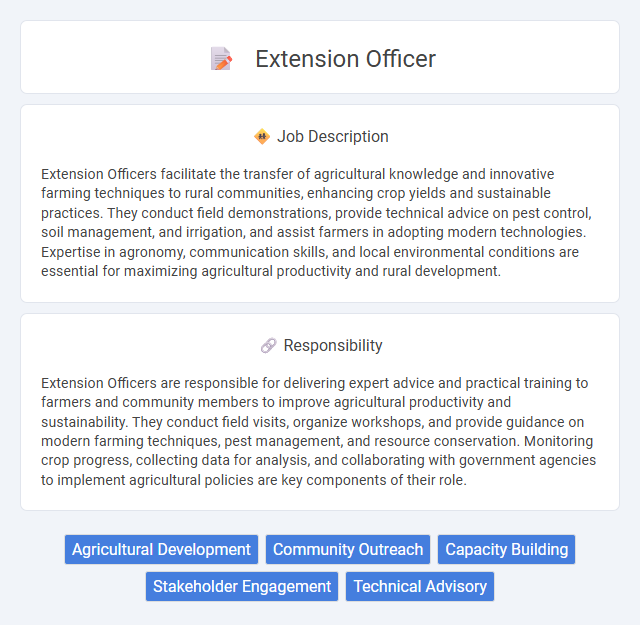
Extension Officers facilitate the transfer of agricultural knowledge and innovative farming techniques to rural communities, enhancing crop yields and sustainable practices. They conduct field demonstrations, provide technical advice on pest control, soil management, and irrigation, and assist farmers in adopting modern technologies. Expertise in agronomy, communication skills, and local environmental conditions are essential for maximizing agricultural productivity and rural development.
Extension Officers are likely to be well-suited for individuals who are empathetic, patient, and skilled in communication, as the role often involves working closely with diverse communities to provide guidance and support. Those with a genuine interest in agriculture, rural development, or community welfare may find this job fulfilling and manageable despite occasional challenges like remote locations or resource limitations. Candidates who thrive in dynamic environments and possess problem-solving abilities probably have a higher chance of excelling in this position.
Qualification
Extension Officers typically require a bachelor's degree in agricultural science, environmental studies, or related fields, with some roles favoring advanced degrees for specialized expertise. Strong communication skills and practical experience in community engagement or fieldwork are essential to effectively transfer knowledge and innovations to farmers and stakeholders. Certification or training in project management and sustainable agricultural practices enhances an Extension Officer's ability to implement impactful programs.
Responsibility
Extension Officers are responsible for delivering expert advice and practical training to farmers and community members to improve agricultural productivity and sustainability. They conduct field visits, organize workshops, and provide guidance on modern farming techniques, pest management, and resource conservation. Monitoring crop progress, collecting data for analysis, and collaborating with government agencies to implement agricultural policies are key components of their role.
Benefit
Extension Officer roles likely offer benefits such as professional growth through hands-on experience in agriculture or community development fields. The position probably provides opportunities for skill enhancement in communication, problem-solving, and project management. Employees in this role may also experience job satisfaction by contributing to community improvement and sustainable practices.
Challenge
Extension Officer roles likely involve navigating complex challenges such as engaging diverse communities with varying needs and limited resources. The probability of encountering resistance to new agricultural technologies or practices may require strong communication and problem-solving skills. Managing these challenges effectively could enhance sustainable development and community empowerment.
Career Advancement
Extension Officers gain expertise in agricultural practices and community development, positioning them for leadership roles within government agencies and non-profit organizations. Advanced certifications and specialized training in agricultural technology and rural management can accelerate career growth. Opportunities for career advancement include becoming program managers, policy advisors, or senior researchers driving sustainable development initiatives.
Key Terms
Agricultural Development
Extension Officers in agricultural development play a crucial role in bridging the gap between research institutions and farmers by providing expert advice on sustainable farming practices, pest management, and crop enhancement techniques. They facilitate technology transfer, conduct training programs, and support community-based projects to improve crop yields and promote environmental conservation. Their expertise directly contributes to rural economic growth, food security, and the adoption of innovative agricultural methods.
Community Outreach
Extension Officers play a vital role in community outreach by facilitating access to agricultural knowledge, health resources, and educational programs. They engage directly with local populations to promote sustainable practices, improve livelihoods, and foster community development. Their work involves organizing workshops, demonstrations, and training sessions tailored to the specific needs of rural and underserved communities.
Capacity Building
Extension Officers play a vital role in capacity building by delivering tailored training programs and practical demonstrations to farmers and community groups. They assess local needs to implement effective strategies that enhance agricultural productivity, resource management, and sustainable practices. Their expertise in knowledge transfer fosters skill development, empowering stakeholders to adopt innovative technologies and improve livelihoods.
Stakeholder Engagement
Extension Officers play a vital role in stakeholder engagement by facilitating communication between agricultural experts, local farmers, government agencies, and community organizations. They organize workshops, field demonstrations, and advisory services to ensure the effective transfer of knowledge and technology tailored to stakeholder needs. Their strategic collaboration fosters sustainable agricultural development and promotes enhanced productivity across farming communities.
Technical Advisory
Extension Officers provide specialized technical advisory services to farmers and agricultural businesses, enhancing productivity through expert guidance on modern farming techniques, pest management, and crop selection. They analyze soil quality, recommend appropriate fertilizers, and implement sustainable practices to optimize yields while minimizing environmental impact. Their role includes training local communities in adopting innovative technologies and ensuring compliance with agricultural regulations.
 kuljobs.com
kuljobs.com